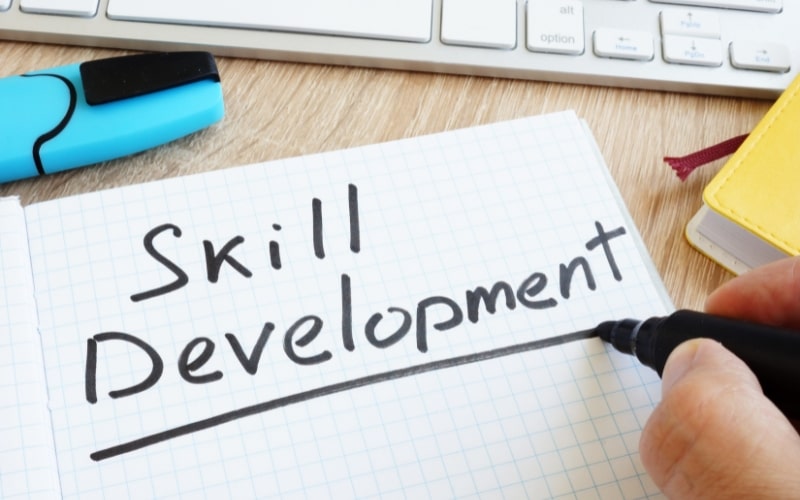Advancing in your career and securing a promotion often involves more than just performing well in your current role. It requires a strategic approach, including understanding the promotion process, setting clear career goals, developing essential skills, building strong professional relationships, and demonstrating leadership and initiative. In this article titled “How to Make Progress: Get Promoted,” we will guide you through these critical areas, providing practical tips and strategies to help you make progress and achieve the promotion you deserve.
1. Understanding the Promotion Process

Overview
Understanding the promotion process is a fundamental step in advancing your career. Promotions are often viewed as a reward for hard work and dedication, but they also require strategic planning and a deep understanding of what employers value. Each organization has its own set of criteria and processes for promotions, and recognizing these can significantly enhance your chances of climbing the corporate ladder.
Key Factors
Several key factors influence whether you get promoted as you make progress in your career. Performance is undoubtedly at the forefront. Employers look for individuals who consistently exceed expectations and deliver exceptional results. This means not only meeting but surpassing the targets set for your role. Additionally, demonstrating a high level of commitment and reliability is crucial. Employers value employees who are dependable and can be trusted to handle increased responsibilities.
Another critical factor is leadership potential. Employers seek individuals who can take on greater roles and responsibilities and who can effectively lead teams. This doesn’t necessarily mean holding a management position; it can also involve displaying leadership qualities in your current role. This might include taking the initiative on projects, mentoring colleagues, or contributing to strategic discussions.
Skills and competencies also play a significant role. As you aim for higher positions, the skill set required becomes more complex and varied. This includes both technical skills related to your field and soft skills such as communication, problem-solving, and teamwork. Employers are looking for well-rounded individuals who can adapt to different challenges and contribute to various aspects of the business.
Company Policies
Understanding your company’s specific promotion policies and procedures is crucial if you want to make progress in your career. Every organization has its own way of handling how employees get promoted, and being familiar with these can give you a competitive edge. Start by reviewing the employee handbook or any available internal documentation on career development and promotions. This will give you an idea of the formal requirements and processes.
It’s also helpful to have open conversations with your manager or HR department. Discussing your career goals and asking for feedback on what you need to achieve to be considered for a promotion can provide valuable insights. It shows that you are proactive and serious about your career progression.
Many companies have formal performance review processes where promotions are discussed. Ensure you are prepared for these reviews by documenting your achievements and contributions. Highlight how you have met or exceeded your targets, and provide examples of your leadership and initiative. This will help build a strong case for why you deserve to be promoted.
Performance Reviews
2. Setting Clear Career Goals

Setting clear career goals is essential for anyone aiming to advance in their professional life. Without a clear direction, it’s challenging to measure progress or achieve desired outcomes. Career goals provide a roadmap for success, helping individuals focus their efforts and make informed decisions about their professional development. Here’s how you can effectively set and achieve your career goals.
Identify Your Aspirations
The first step in setting career goals is to identify your aspirations, which is essential if you want to make progress in your professional journey. This involves reflecting on what you truly want from your career and considering how these aspirations align with potential opportunities to get promoted. Think about your passions, strengths, and long-term interests. Ask yourself questions like, “Where do I see myself in five or ten years?” and “What roles or industries excite me?” Understanding your aspirations will help you set goals that are aligned with your values and interests, making it easier to make progress and work towards getting promoted.
SMART Goals
Action Plan
After setting SMART goals, it’s important to create a detailed action plan outlining the steps needed to make progress and eventually get promoted. Break down each goal into smaller, manageable tasks and set deadlines for each task. This approach will make your goals seem less overwhelming and more attainable.
For instance, if your goal is to become a project manager, your action plan might include steps such as completing a project management course, gaining experience by leading small projects, and seeking mentorship from experienced project managers. Regularly review and adjust your action plan as needed to stay on track, make progress, and overcome any obstacles that arise on your path to getting promoted.
Continuous Learning and Development
Achieving your career goals and getting promoted often requires continuous learning and development. To make progress in your career, stay updated with industry trends, and seek opportunities for professional growth. This could involve attending workshops, participating in online courses, or pursuing advanced degrees and certifications. Additionally, seek feedback from colleagues and supervisors to identify areas for improvement and develop a plan for enhancing your skills.
Networking is also a crucial part of making progress in your career. Connect with professionals in your field, attend industry events, and join professional organizations. Networking can provide valuable insights, support, and opportunities that can help you achieve your career goals and position yourself for a promotion.
Staying Motivated and Committed
Finally, staying motivated and committed to your career goals is crucial for success. Celebrate your achievements, no matter how small, and use them as motivation to keep moving forward. Stay positive, and don’t get discouraged by setbacks or challenges. Remember that career advancement is a journey, and persistence and determination are key to getting promoted and reaching your destination.
Regularly revisit your goals and action plan to ensure they remain relevant and aligned with your aspirations. Adjust them as needed to reflect changes in your interests, industry trends, or personal circumstances. By staying focused and committed, you can make progress in your career and achieve significant milestones in your professional life.
Setting clear career goals is a powerful tool for personal and professional growth. By identifying your aspirations, setting SMART goals, creating a detailed action plan, committing to continuous learning, and staying motivated, you can make progress in your career objectives and position yourself for a well-deserved promotion.
3. Developing Key Skills and Competencies

Developing key skills and competencies is essential for anyone looking to advance their career and achieve professional success. In today’s rapidly evolving job market, staying competitive means continuously improving and expanding your skill set. Here’s a comprehensive guide on how to develop the skills and competencies necessary for career advancement.
Skill Assessment
The first step in developing key skills and competencies is to conduct a thorough skill assessment. This involves evaluating your current abilities and identifying areas where you need improvement to make progress in your career. Start by listing your core skills—those that are essential for your job—and then consider the skills that are increasingly relevant in your industry, which could help you get promoted.
A useful method for skill assessment is the SWOT analysis (Strengths, Weaknesses, Opportunities, and Threats). This tool helps you recognize your strengths and weaknesses, identify opportunities for growth, and potential threats to your career progression. By understanding where you currently stand, you can create a targeted development plan to make meaningful progress and position yourself for promotion.
Continuous Learning
Soft Skills Development
While technical skills are essential, soft skills are equally important in today’s workplace if you want to make progress and get promoted. Soft skills, such as communication, teamwork, problem-solving, and leadership, play a critical role in your ability to succeed and advance in your career.
- Communication: Effective communication is key in almost every aspect of professional life. Practice active listening, clear and concise writing, and persuasive speaking. Seek feedback on your communication style and work on areas that need improvement.
- Teamwork: Being able to work well with others is crucial, especially in collaborative environments. Developing strong teamwork skills can significantly help you make progress in your career. Focus on building relationships, managing conflicts, and contributing to team success. Participate in group projects and volunteer for team-based activities to enhance your ability to work within a team.
- Problem-Solving: Employers value individuals who can think critically and solve problems efficiently. By honing your problem-solving skills, you can demonstrate your readiness to take on more significant responsibilities and get promoted. Tackle complex tasks, analyze case studies, and engage in strategic thinking exercises to improve this vital skill.
- Leadership: Leadership is not just about managing others; it’s also about inspiring and guiding your peers. Taking on leadership roles in projects, mentoring junior colleagues, and seeking out opportunities to demonstrate your leadership abilities can help you make progress in your career and position yourself for a promotion.
Seeking Feedback and Mentorship
Seeking feedback and mentorship is an effective way to accelerate your skills development and make progress in your career. Feedback from supervisors, peers, and mentors can provide valuable insights into your performance and highlight areas for improvement, helping you get closer to being promoted. Actively seek constructive criticism and use it to refine your skills.
Mentorship offers guidance, support, and advice from experienced professionals, which can be crucial in helping you make progress toward your goals. A mentor can help you navigate your career path, set realistic goals, and provide resources for skill development, ultimately positioning you for a promotion. Establishing a strong mentoring relationship can significantly enhance your professional growth.
Practical Application
Finally, the practical application of your skills and competencies is crucial for development. Look for opportunities to apply what you’ve learned in real-world scenarios. Take on challenging projects, volunteer for cross-functional teams, and seek out assignments that push you out of your comfort zone. The more you apply your skills, the more proficient and confident you will become.
4. Building Strong Professional Relationships

Building strong professional relationships is a critical component of career advancement. These relationships can provide support, guidance, opportunities for collaboration, and a network that can help you navigate your career path. Here’s a comprehensive guide on how to effectively build and maintain strong professional relationships.
Networking
Networking is the foundation of building professional relationships. It involves creating a web of contacts within and outside your industry. Effective networking can open doors to new opportunities, provide valuable insights, and help you stay informed about industry trends.
- Attend Industry Events: Participate in conferences, seminars, and workshops relevant to your field. These events are excellent opportunities to meet new people, exchange ideas, and learn from industry leaders.
- Join Professional Organizations: Becoming a member of professional associations can help you connect with peers and experts in your industry. These organizations often offer networking events, forums, and resources that can be valuable for your career.
- Utilize Social Media: Platforms like LinkedIn are powerful tools for networking. Connect with colleagues, join industry groups, and participate in discussions. Share relevant content and engage with others’ posts to increase your visibility and build your professional network.
Mentorship
Mentorship plays a significant role in professional development. A mentor can provide guidance, advice, and support as you navigate your career. They can help you set goals, develop new skills, and offer insights based on their experience.
- Finding a Mentor: Look for someone whose career you admire and who possesses the skills and knowledge you wish to acquire. This could be a senior colleague, industry leader, or someone outside your immediate work environment.
- Building the Relationship: Approach potential mentors with a clear idea of what you hope to gain from the relationship. Be respectful of their time and willing to put in the effort to maintain the relationship. Regularly update them on your progress and seek their advice on specific issues.
- Being a Mentor: Mentorship is a two-way street. If you have the opportunity to mentor someone, take it. Teaching and guiding others can help you refine your own skills and gain new perspectives.
Visibility
Increasing your visibility within your organization and industry is crucial for building professional relationships. When people are aware of your contributions and capabilities, they are more likely to reach out for collaboration and support.
- Take Initiative: Volunteer for projects and tasks that go beyond your job description. Show your willingness to take on challenges and contribute to the organization’s success.
- Share Your Achievements: Don’t be afraid to highlight your accomplishments. Whether it’s through presentations, reports, or informal conversations, make sure your contributions are recognized.
- Engage in Company Activities: Participate in company events, social gatherings, and team-building activities. These are great opportunities to interact with colleagues in a more relaxed setting and build stronger relationships.
Building Trust
Trust is the cornerstone of any strong professional relationship. It takes time and consistent effort to build trust, but it is essential for meaningful and lasting connections.
- Be Reliable: Follow through on your commitments and be dependable. When people can count on you, they are more likely to trust you.
- Communicate Effectively: Clear and honest communication is key to building trust. Be open about your intentions, listen actively, and provide constructive feedback.
- Show Integrity: Maintain high ethical standards in all your professional interactions. Honesty and integrity build a solid foundation for trust and respect.
Collaboration
Collaboration is a vital aspect of building professional relationships. Working effectively with others can lead to greater innovation, productivity, and job satisfaction.
- Foster Teamwork: Encourage a collaborative environment where team members feel valued and heard. Promote open communication and mutual respect within the team.
- Seek Diverse Perspectives: Embrace diversity in your collaborations. Different viewpoints can lead to more creative solutions and a broader understanding of challenges.
- Recognize Contributions: Acknowledge and appreciate the efforts of others. Recognizing contributions fosters a positive and collaborative work environment.
5. Demonstrating Leadership and Initiative

Demonstrating leadership and initiative is essential for career advancement and achieving professional success. These qualities show that you can take charge, drive projects forward, and inspire others to perform at their best. Here’s a comprehensive guide on how to effectively demonstrate leadership and initiative in your career.
Taking Initiative
Taking initiative means being proactive and not waiting for instructions to act. It involves identifying opportunities and challenges and addressing them without being asked. This quality is highly valued by employers as it shows that you are self-motivated and capable of driving progress.
- Identify Opportunities: Look for areas in your work that could be improved. This might be a process that can be streamlined, a project that needs additional support, or a new idea that could benefit the company. Once you identify these opportunities, take the first step to address them.
- Volunteer for Projects: Don’t wait to be assigned tasks. Volunteer for projects, especially those that are high-profile or challenging. This shows that you are willing to take on responsibility and are committed to the organization’s success.
- Solve Problems: When you encounter problems, think about possible solutions before bringing them to your supervisor. Presenting a problem along with potential solutions demonstrates initiative and critical thinking.
Leadership Opportunities
Leadership is not confined to managerial roles. You can demonstrate leadership in various ways, regardless of your position in the company. It’s about influencing and guiding others towards achieving a common goal.
- Lead by Example: Model the behavior you expect from others. This includes being punctual, meeting deadlines, and maintaining a positive attitude. Your actions set the standard for your colleagues and can inspire them to follow suit.
- Mentor and Support: Offer guidance and support to your colleagues, especially those who are less experienced. Mentoring others not only helps them grow but also demonstrates your leadership capabilities.
- Take Responsibility: When leading a project, take full responsibility for its success and failures. This shows that you are accountable and can handle the pressure of leadership.
Performance Reviews
Performance reviews are an excellent opportunity to showcase your leadership and initiative. Use these reviews to highlight your achievements and discuss how you have demonstrated these qualities in your work.
- Prepare Documentations: Document your accomplishments and how you have gone above and beyond your job requirements. Provide specific examples of projects you initiated, problems you solved, and how you led your team to success.
- Seek Feedback: Ask for feedback on your leadership and initiative. Constructive criticism can help you identify areas for improvement and demonstrate your commitment to personal and professional growth.
- Set Goals: Use performance reviews to set goals that focus on developing your leadership skills. This shows that you are serious about advancing in your career and are taking proactive steps to achieve your goals.
Building a Leadership Mindset
Developing a leadership mindset involves thinking strategically, being adaptable, and continuously improving. This mindset is crucial for long-term career success.
- Think Strategically: Always consider the bigger picture. Understand how your work contributes to the organization’s goals and think about ways to align your actions with these objectives.
- Be Adaptable: The business environment is constantly changing, and leaders need to adapt quickly. Be open to new ideas, learn from your experiences, and be willing to change your approach when necessary.
- Commit to Continuous Improvement: Leadership is a continuous journey. Invest in your personal development through training, reading, and seeking mentorship. Continuously work on improving your skills and knowledge.
Communicating Your Vision
Effective leaders communicate their vision clearly and inspire others to follow it. This involves articulating your ideas and goals in a way that motivates and engages your team.
- Clarity and Conciseness: Ensure your communication is clear and to the point. Avoid jargon and be direct about what you want to achieve.
- Inspire and Motivate: Use positive language and emphasize the benefits of achieving the goals. Show enthusiasm and confidence in your vision.
- Listen and Engage: Effective communication is a two-way street. Listen to feedback from your team and engage them in discussions. This fosters a collaborative environment and shows that you value their input.
Conclusion – How to Make Progress and Get Promoted
In conclusion, making progress in your career and achieving a promotion requires a multifaceted approach. By understanding the promotion process, setting and pursuing clear career goals, continuously developing key skills, building strong professional relationships, and demonstrating leadership and initiative, you can position yourself as a valuable and indispensable asset to your organization. These strategies not only enhance your chances of getting promoted but also contribute to your overall professional growth and success. Remember, career advancement is a journey that demands dedication, persistence, and a proactive mindset. Ready to take your goal-setting to the next level? Check out our article ‘5 Simple Techniques to Hold on to Your Goals‘ and stay on track for your next promotion!


